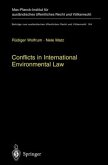This volume is an important contribution to both theoretical and practical approaches to solving contradictions and conflicts between the approaches, principles, objectives and regulations of international environmental agreements. The issue of the coordination and streamlining of environmental agreements is of growing importance regarding the increasing number of international regulations on the one hand and the urgency for effective instruments in the light of continuing environmental degradation on the other. This study will become an essential reference for scholars as well as practitioners working in the field of international environmental law.
From the reviews: "The authors cover the main causes of conflicts in international environmental management well, illustrating each cause clearly with interesting examples. ... The authors research the focal areas with care and provide very balanced and well argued recommendations. The book is a very compact, easily readable, and well structured work. ... The book's greatest merits are perhaps its very interesting and practical illustrations of actual and potential treaty conflicts and is very well-grounded recommendations on how to mange treaty conflicts better in the future." (Timo Koivurova, Finnish Yearbook of International Law, 2007)








